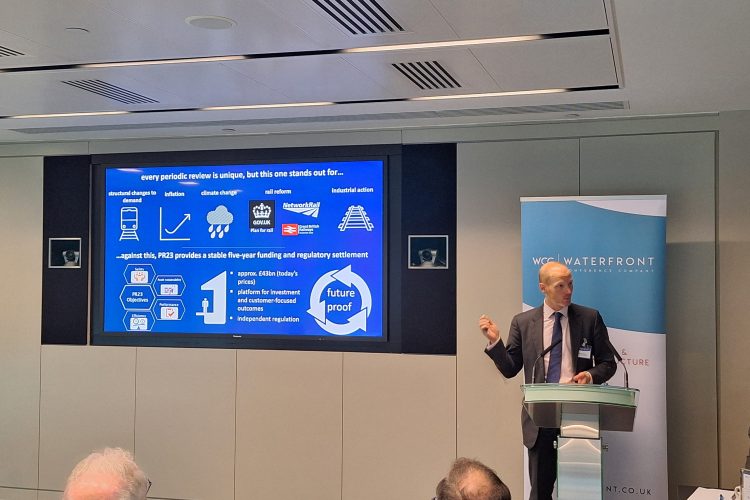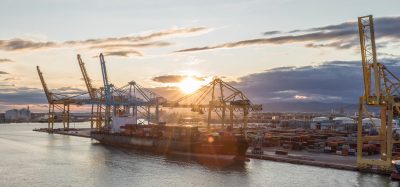OFF THE RAILS: ORR’s Director of Economics, Finance and Markets, Will Godfrey
Posted: 9 May 2024 | Emily Budgen | No comments yet
In this week’s ‘Off the Rails’, I spoke to the Office of Rail and Road (ORR)’s Director of Economics, Finance and Markets, Will Godfrey.


What was your route into rail?
I started in rail over twenty years ago, when I joined the ORR. Back then, the ORR was the Office of Rail Regulation and just covered the economic regulation of rail. So since then, the ORR has grown to take on both rail safety and oversight of the strategic road network – which is why we are now the Office of Rail and Road.
Between my times in the rail industry I worked in telecoms regulation and more recently in the water sector. The opportunity to return to rail presented itself back in 2022, which with the combination of rail reform and the opportunity to lead a periodic review of Network Rail, was an opportunity that was too good to refuse.
At the Waterfront Conference’s Rail Industry Forum, hosted by Addleshaw Goddard, you talked a little bit about the role of the periodic review. What is the current role of the periodic review and how does it help the rail industry?
So the periodic review is a really important part of what the ORR does as the independent economic regulator. It sets the five year funding settlement and also the outcomes and the performance required from Network Rail in return for that very significant funding.
The five year settlement is worth, in cash terms, about £45 billion – that’s a huge amount of money, a significant part of which is publicly funded.
It’s really important that we get good value for money, but also that we get good outcomes in return for that. That is what the periodic review does.
It basically sets up those expectations over the next five years. It also sets the charges and the financial incentives that train operators will be experiencing in their interface with Network Rail. This concerns all train operators, whether they’re publicly funded or commercially funded, like the open access operators, or indeed the freight operators.
While every periodic review has something unique about it, what made this one stand out was quite how much change and uncertainty there was going on all around us. It isn’t every periodic review that is conducted with inflation at a 40 year high; industrial action; rail reform and a sector recovering from the shift in passenger demand and revenue reduction following a global pandemic.
So against this backdrop of change and uncertainty, the value of a stable five-year funding and regulatory settlement overseen by an independent regulator has in my view never been more important.
We recently had the UK Labour Party present their new policy which emphasised the increased role the state would play, if they were to win the next general election. Would that change the periodic review process?
I do think it’s early to say at this stage, but it certainly would be something that ORR would be happy to discuss with any new incoming administration. I think the important thing to remember is that even with a nationalised system, if there are still others that use the network, it is important that they effectively have fair and reasonable access in terms of use of the network, and also what they pay to use the network, and any financial incentives that they would face.
For example, we would still have an important open access presence in the passenger market and would still have commercial freight operators under the Labour Party proposals. So the importance of maintaining fair access to the network for all operators remains.
Then of course, there are broader discussions to be had about matters such as how you hold the publicly owned integrated rail body to account, and some interesting points that arise on the consumer protection side of things.
A theme of the conference, which was discussed throughout the day, was the idea of long term planning and the direction of strategy for the rail industry. How will ORR continue their role, possibly over the next decade?
We’ve just completed the most recent five year review which runs from 2024 to 2029, that sets up the funding and the regulatory requirements of Network Rail for that five year period. However, getting to that process was challenging because we were trying to do it in a future proof way, anticipating an integrated rail body, such as GBR [Great British Railways].
So, we were trying to get a settlement for the infrastructure side that would be robust to that sort of change. Doing so, I think, has revealed the challenge of moving to whole industry performance measures that we want to hold the company to account on. So, when you account for the fact that the train operators remained separate from the infrastructure manager (Network Rail) in the run up to this control period, and for the fact that they’re on much shorter planning cycles than the infrastructure manager, that has proved to be a particular challenge during this periodic review.
I think one of the advantages of moving to the next control period is if there is a properly integrated rail body at that point, then one would hope that those planning cycles are much better aligned in terms of the opportunity to be able to set not just the funding but also the regulatory requirements in terms of, for example, training performance.
I would also like to talk a bit more about the significance of five year control periods overseen by an independent regulator. I think the simple point is, that across rail and other regulated infrastructure sectors, such as water, energy, telecoms, typically we have tended to come back to that five-year period as being the right basis.
Annual planning means you are running from year to year (which isn’t great for investment, stability and incentives for efficiency) but longer than five-years and you’re looking a long way into the future (which brings an increased risk of forecast error). . So obviously these are very long-lived assets, way beyond five years, but five years is the typical sweet spot for the regulatory cycle in infrastructure sectors like rail.
Finally, I would make the point that there are other companies that are not necessarily part of the entity that is regulated, but that use the network. They need to plan their own businesses over the long-term as well, but with the assurance of fair access or use of any monopoly infrastructure – which is where the independent regulator comes in.
Breaking it down to make it a little bit more manageable. My final question to you is this: 2024 is Global Railway Review’s thirtieth birthday, its pearl anniversary. Do you have a pearl of wisdom for us?
I think my pearl of wisdom is that this is a wonderfully resilient sector. The pandemic was a real hit, but I think what we’ve seen is that we’ve had a reasonably good recovery already, and I’m optimistic there’s much more to come.
There are prospects for rail which remain untapped, so looking to the next thirty years, I’m optimistic we may just see the COVID period as a blip on an otherwise upwards trajectory.
More challenges will come, but as we look to rail reform, let’s learn from the past and ensure we maintain that resilience and develop an industry structure that delivers for passengers and freight users.
More Like This
OFF THE RAILS: Connected Places Catapult’s Head of Rail Business Development, Kristoff van Leeuwen
OFF THE RAILS: Ben Cullen – Knowledge Transfer Manager at Innovate UK Business Connect
OFF THE RAILS: Secretary General of the AERRL, Carole Coune
Related organisations
Addleshaw Goddard, Great British Railways (GBR), Network Rail, Office of Rail and Road (ORR), Waterfront Conference








